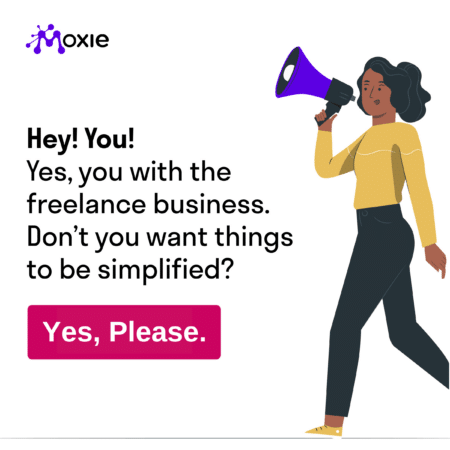Are you considering becoming one of the almost 60 million freelancers in the US? Do you feel ready to quit your job and turn what is now perhaps a side gig into a full time freelance career?
Before you make this tough but potentially very rewarding decision, consider some of the pros and cons of freelancing.
On the plus side, full time freelance work makes you your own boss – you can work flexible hours and choose your own clients. You can easily find cheap flights and take your work with you anywhere you please.
However, as a freelancer, you will also be working on your own. There will be no one to pick up the slack when you aren’t feeling very productive or when you need to take a break. And while you will certainly be the boss, you will also be the one who needs to meet the demands of a lot of different clients.
If you still feel that becoming a freelancer full-time is the way to go, here are the seven steps you will need to take and the questions you should be asking yourself before you make that leap.

What to Consider Before Going Full Time Freelance
Freelancing full-time is a lot more difficult than you may initially think.
Once you have established a solopreneurship and have a couple of long-term clients under your belt, it does get easier. But before that happens, here is what you need to consider before going full time freelance.
Where Will I Be Looking for Work?
The first thing to consider before you become a full time freelancer is where you will be looking for work. There are plenty of freelance jobs sites you can utilize, but before you start registering accounts on all of them, do some research.
Depending on the services you will be offering, you may be able to find clients through a specialized job board. 99designs, for example, is a great option for designers, while ProBlogger has a job board that is specifically tailored to writers. You can also sign up for SolidGigs which will send you the top job listings specifically picked for you directly to your inbox.
Consider these three key factors:
- the rates others with your skill set are offering
- the number of similar freelancers on the platform
- the rates the platform itself will charge you
Once you have all this information, you can single out a couple of projects that seem best suited for you. Don’t try to cover more, as you will end up spending too much time looking for work and not enough on perfecting your pitch.
Can I Sell My Own Skills?
To become a successful full time freelancer, you need to be very good at two things:

- performing a certain service – i.e., having a skill set you can turn into an income
- being able to sell that same skill set
Most freelancers never even stop to think about their sales and marketing skills before they start looking for clients. This is when they discover they are rather bad at singing their own praises or that they are terrible at negotiating.
Take some time to honestly take stock of your own traits. How likely are you to convince someone you are the best person for the job? Do you perhaps need to brush up on your communication skills? Do you need to learn more about writing the perfect pitch before you go into full time freelance work?
Don’t be afraid to postpone your plans for a short while if it means you will be able to hit the ground running.
How Much Money Do I Have Saved up?
When you first start to freelance full-time, you will most likely not be able to fill up your entire workday with actual work. You will need to spend a lot of time finding clients and negotiating contracts, so your earnings are likely to be less than you would like.
It’s important to consider your finances before you quit your day job. Will you be able to uphold your current lifestyle over the course of those initial full-time freelancing months when your income won’t be what you hope it to be?
Ideally, you want to have some money saved up for this purpose — a solid 3-6 months worth you can live on should be a decent cushion to help you get started.
You should also face the fact that you may need to cut down on some of your expenses. You don’t necessarily need to cut all the fun out of your life, but some changes might be in order. For example, it could be something simple like one less takeout coffee a day.
How Will It Impact My Lifestyle?
Going full time freelance will also impact your lifestyle. Unless you’ve already been working from home on your own, there will be some changes to adjust to.

First, there is the loneliness and sense of isolation that can come with freelancing. There will be no colleagues you can chat with about your day, and no one else will understand the work you are doing. You’ll definitely need to make sure you find someone you can talk to, whether that’s a friend or a fellow freelancer.
Secondly, note that although your schedule will be flexible, that doesn’t mean that you can go out every night, have a break in the middle of every day, or that you won’t have to work late into the night on a weekend.
Try to establish your own working hours and schedule your personal life around them. If you keep giving in to every non-work-related impulse, you may end up not hitting your goals.
However, don’t forget that you do need to take a break and that you can’t work 14 hours every day, no matter how important or exciting the work is. You will find a workable balance over time, but at first, you might need to remind yourself either that breaks are required or that you can’t keep taking an hour’s break every hour.
How Much Money Can I Earn?
Finally, there is the crucial consideration of your income when going full time freelance. Certain skills can earn you a hefty paycheck, while other jobs won’t be nearly as lucrative.
When you first start out, your prices will most likely be a bit lower. You will, however, need to keep steadily raising them until you hit that level of expertise and confidence where clients will be coming to you.
In order to earn more money as a freelancer, you will have to keep working on your networking, pitching, and core industry skills, so plan for an increase in earnings each year.
Make sure that the money you expect to earn in a worst-case scenario (and the money you have set aside for your first months of full-time freelancing) is enough to get you through the day and allows you to maintain your current lifestyle. Alternatively, make sure you’re ready to make any of the changes that a decrease in income will demand.

Remember: if you are too stressed out about the money, you won’t be able to be as productive or as effective as you would like to. So, make sure that part checks out before you go full-time.
7 Steps to Go Full Time Freelance
Here are the steps you need to take to become a full time freelancer:
1. Define Your Services
First, you will need to define the services you offer as precisely as possible. Don’t just say you offer content writing services, for example. Define the niches you will be writing in, the types of clients you ideally want to work with, and the competencies and skills you are bringing on board.
Take a look at what other freelancers are offering on the platform you want to use, and try to emulate their vocabulary for defining services. It’s what clients will be used to.
2. Consider Your Prices
How much you charge for your services matters a lot, but bear in mind that it won’t be a dealbreaker. There will always be clients who think that you are either too expensive or too cheap for their needs.
The person who needs to be happy with these figures is you. If you feel you are not earning enough, you won’t be happy with your full time freelance career. Make sure you leave room for growth and that you judge your skills and knowledge fairly.
3. Learn All About the Law
Becoming a full time freelancer also means you need to handle your own retirement and health insurance. Your local laws will determine how much taxes you need to pay and what your total expenses per month will be.
Get to know as much about the legal and financial aspects of full-time freelancing and make sure you comply with all the regulations. If you don’t, it may end up costing you more than you’ve bargained for.
4. Put It All on Paper
Write yourself a brief business plan. Cover your projected incomes, your monthly or weekly expenses, and the key points of your business:
- How are you looking for clients?
- What does your pitch look like?
- What are your working hours?
- Where do you work from?
- What kind of equipment do you need?
- What are your goals and targets for each month or quarter?
- How will you attract clients?
Having all of this written down will help you get more done in those first crucial months, when you don’t yet have a set routine.
5. Put Together a Portfolio
To score freelance gigs, you’ll need to put together a portfolio of your previous work. Think of it as your freelancing CV.
You can use a platform like Dribble or Behance, create your business website, or put together a flyer. Do whatever you feel will work for your target clients. Make sure you are honest about your achievements and highlight your core competencies. Last but not least, describe how your work has helped each previous client or employer achieve their goals.
6. Tap into Your Network
In order to propel your full time freelance career as quickly as possible, don’t forget to let all of your networks know what you are doing. Friends and family (even those who may not quite understand what you do) have their own networks they can recommend you to.
Don’t just update your LinkedIn status, but rather reach out to old clients or colleagues as well. You never know who might be looking to work with someone like you.
7. Learn When to Say No
The last step you need to take in launching your full time freelance career is learning when to say no.
You shouldn’t work with all of the clients that come your way. Sometimes you won’t be able to agree on a rate, and at other times they will be asking you to work on a project you aren’t actually interested in.
Don’t be afraid to refuse a project that you know you don’t want to work on. It may seem like you need to grab every single opportunity that arises, but don’t fret – others are just around the corner. So, don’t lock yourself into work you don’t even like, as it can prevent you from applying for an amazing project in a couple of weeks’ time.
5 Questions to Find out if You’re Ready to go Full Time Freelance
Freelancing is still very much worth it in 2022. But before you become a full time freelancer, ask yourself these five questions to ensure freelancing is the right career move for you.
1. What Skills Do I Have?
In order to build your freelance career, you will need a specific set of skills, as not everything you are good at can be sold as a freelance service. Most freelance jobs are online ones, so if you are a plumber, for example, you will need to start a business.
Analyze your core competencies and any other, softer skills you may have. They will help you figure out the kinds of jobs you want to work on.
Be honest about your knowledge. If you were good at english grammar in high school, it doesn’t mean you can now become a freelance tutor.
2. Can I Hold Myself Accountable?
One of the biggest challenges of freelancing is that there is no one to hold you accountable for your work other than your client. But before the client sees any of your work, you need to actually get it done. And there is no one to make you get up and do it.
If you are the kind of person who prefers to procrastinate and do a rush job at the eleventh hour, you may find freelancing too challenging. In order to succeed, you will need to develop (or improve) your organizational and time management skills. If these are your weakest suits, perhaps now is not the best time to go full time freelance.
If you are able to hold yourself accountable and understand when you need to push yourself and when to cut yourself a bit of slack, freelancing is a great option.
3. Am I Ready to Work Alone?
The other major challenge freelancers face is the loneliness that comes with the job. There is most often no one to talk to, and you can rely only on yourself to get a job done.
If you thrive off teamwork and prefer to work in a large group of people, freelancing full-time may be too hard on your mental health. On the other hand, if you like to work alone and you’d be able to maintain the kind of social life that keeps you grounded, you are ready to go full time.
4. Am I Ready to Work Longer Hours When Necessary?
There will be times when you need to work much longer hours than you would at a 9-to-5 job. There will also most likely be weeks when you barely have time to focus on anything other than work.
If you are the kind of person who prefers to have a set schedule, you can still excel at freelancing. You can set up any kind of timetable that works well for you. However, if you want to be able to predict when each workday will be over and if your lifestyle doesn’t support unexpected challenges and longer hours, you may find it a challenge to keep up with freelance work.
5. Do I Love What I Do?
The best and most successful freelancers are the ones who truly love their work. They aren’t just whiling away the hours until they can go home. They are passionate and ready to work hard on most days.
If you don’t really, genuinely love the work you would do as a full time freelancer, you may want to stick to being an employee. Freelancing entails hard work and some tough times, and if there is no spark to help you get through it, you won’t enjoy your chosen career.
Wrapping It Up
Becoming a full time freelancer can be an incredibly liberating and empowering decision. To set yourself up for success over the long term, make sure to consider these seven steps and five questions before you make that decision. Do your research, get to know the freelance job market, and start building a business you will be proud of.
Keep the conversation going...
Over 10,000 of us are having daily conversations over in our free Facebook group and we'd love to see you there. Join us!


